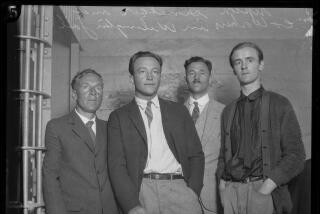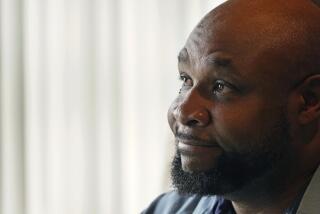Civil Rights Lawyers’ Terror, Triumph
WASHINGTON — In 1967, Clarence Dunnaville Jr. left a high-profile New York law job and headed south, planning to help translate new civil rights laws into progress for black people.
Soon, when he asked a Mississippi constable for help, he learned the hazards of the legal profession.
The police officer “put a shotgun in my face and ran me out of town,” said Dunnaville, now a private attorney in Richmond, Va. “It was very tense at the time.”
Dunnaville and dozens of other attorneys answered President Kennedy’s call in the turbulent 1960s and gave up lucrative careers and the comforts of home--mostly in the North--to join the Lawyers Committee for Civil Rights Under Law.
Celebrating its 35th anniversary, the private nonprofit committee still marshals top attorneys to work without pay on mainly liberal issues such as fair housing and environmental justice. But it was during its dark, early days, in the tension-filled streets of Alabama, Mississippi and elsewhere, that the committee tackled its toughest jobs: protecting voting rights and desegregating schools in the racially divided South.
“We were enforcing laws just on the books,” said Jonathan Shapiro, a Boston lawyer who worked in the committee’s main Mississippi office after graduation from law school in 1965. “It was the most challenging, most exciting, most meaningful thing I have ever done.”
Years of violence and unrest in the South spurred the push for civil rights legislation in the early 1960s. In May 1963, violence exploded on the streets of Birmingham, Ala., with clubs, fire hoses and cattle prods used to keep demonstrators in line. In Mississippi, civil rights leader Medgar Evers was slain in front of his house, and riots erupted when James Meredith tried to enter the University of Mississippi, and the late Gov. Ross Barnett, surrounded by state troopers, turned him away.
On June 11, 1963, hours after federal marshals escorted black students to dormitories at the University of Alabama at Tuscaloosa, Kennedy pledged in a televised address to improve voting rights and access to public facilities through civil rights legislation.
“Those who do nothing are inviting shame as well as violence,” Kennedy said. “Those who act boldly are recognizing right as well as reality.”
Among those who answered his summons was James Robertson, an associate in a Washington law firm.
“There I was in this big Washington law firm while there were cities going up in smoke,” said Robertson, now a U.S. district judge in the capital. In 1968, he relocated to Mississippi to fight employment discrimination.
Many rejected the young lawyers. State bar associations viewed the newcomers as further evidence that the federal government was meddling in their lives. Days after the committee was created, the Mississippi State Bar Assn. said Kennedy’s push for civil rights laws would “add to present confusion and unrest, as will any legislation which is based on the principle of force.”
Despite the angry words and occasional violence, the lawyers kept coming.
David Lipman, driven by “the clarity of what was right,” moved to Mississippi from Pennsylvania with his wife in 1970. He was among lawyers who pushed for restructuring the state prison at Parchman, one of the first statewide prison reform cases of its kind.
The committee “has been the means by which we were able to get a lot of cases successfully tried here,” said former Mississippi state Sen. Henry Kirksey, who is black. Kirksey, who was “just dead-set on designing a district from which blacks could get elected,” had no legal training and turned to the committee for assistance.
The committee’s influence must be looked at “in terms of what was done in making it possible for blacks to get elected to public office,” said Kirksey, now a retired college teacher living in Tougaloo, Miss. “We were able to get more blacks elected to local boards of education and city government.”
The lawyers describe professional and personal challenges they faced as some of their most rewarding moments. In 1995, Shapiro returned to Mississippi for a reunion with fellow committee lawyers and saw “incredible changes,” such as the inclusion of blacks in the hierarchies of local government and courts.
Some say, however, that the committee’s existence 35 years after its emergency creation confirms that the work it aimed to complete remains undone.
“Racism is a disease that cannot totally successfully be inoculated against,” Robertson said. “The one thing you learn working in civil rights is that these issues will never be finished.”
More to Read
Sign up for Essential California
The most important California stories and recommendations in your inbox every morning.
You may occasionally receive promotional content from the Los Angeles Times.









